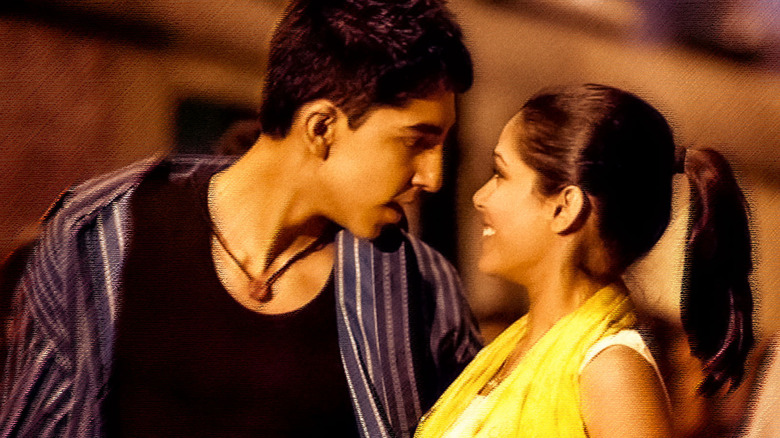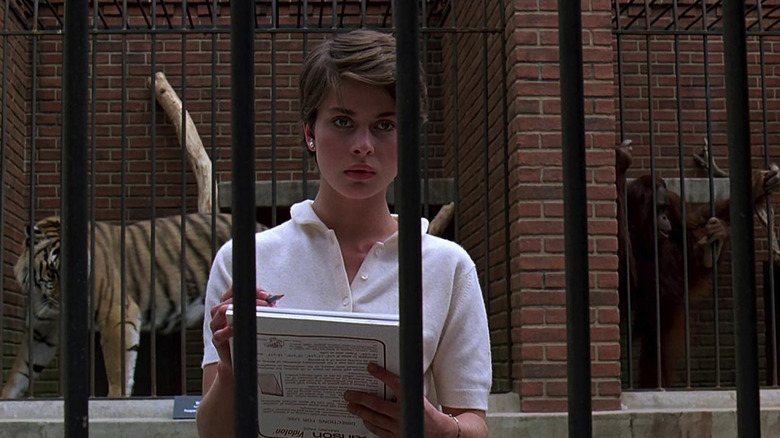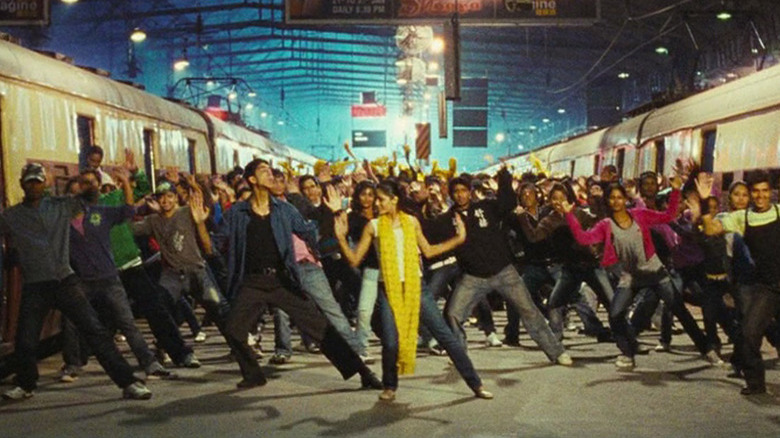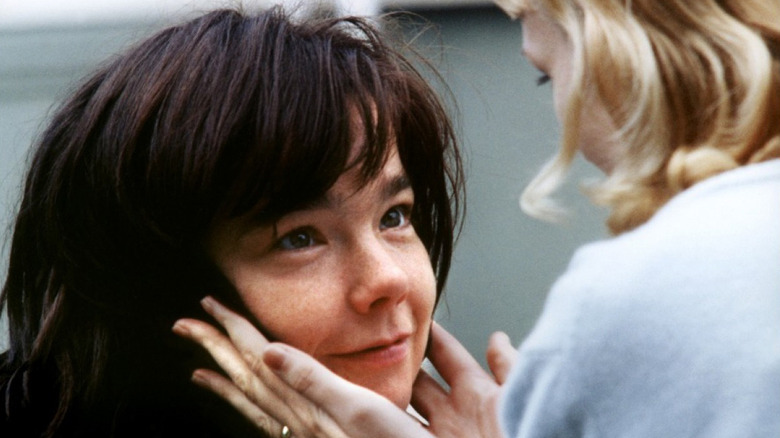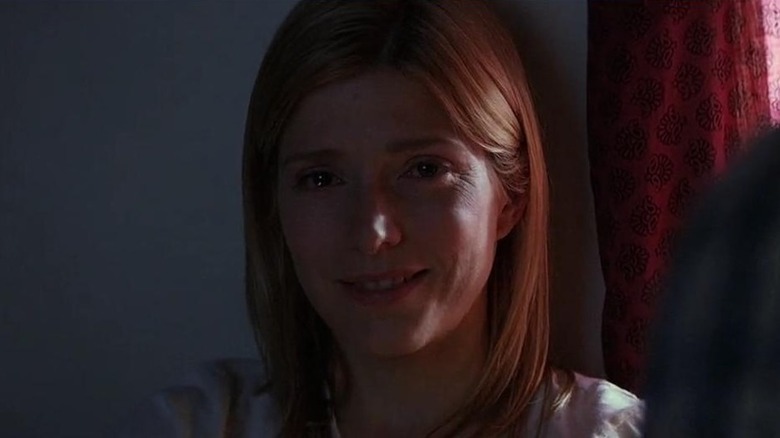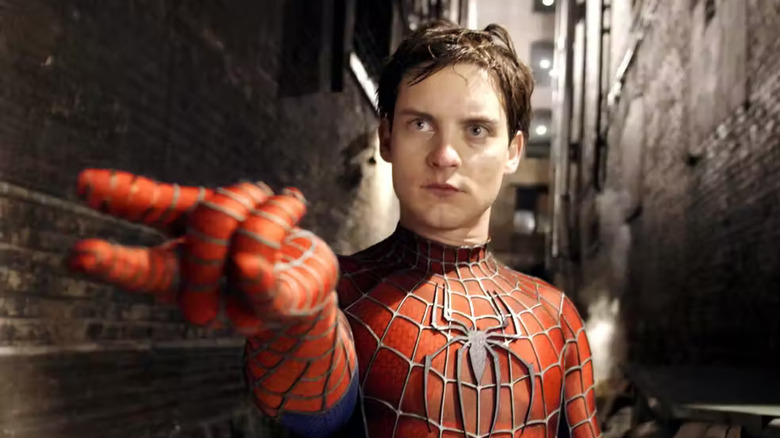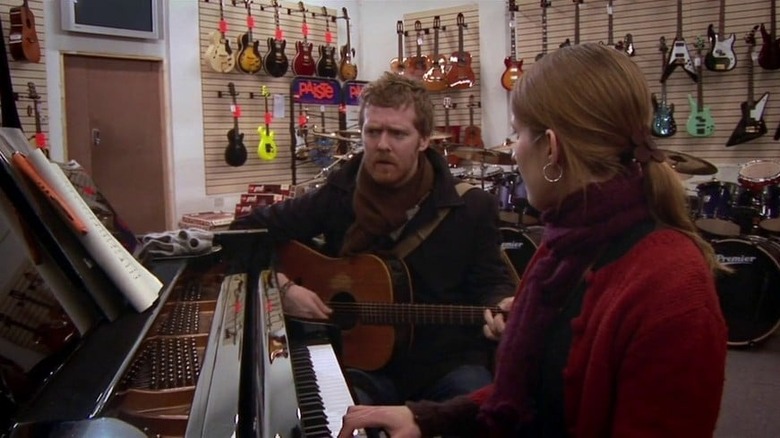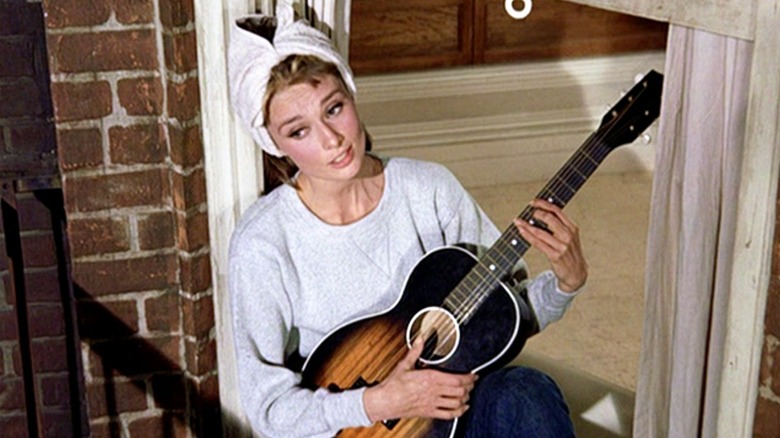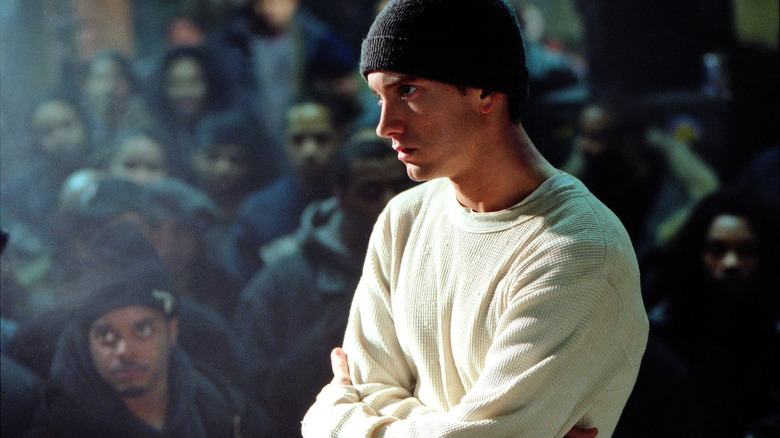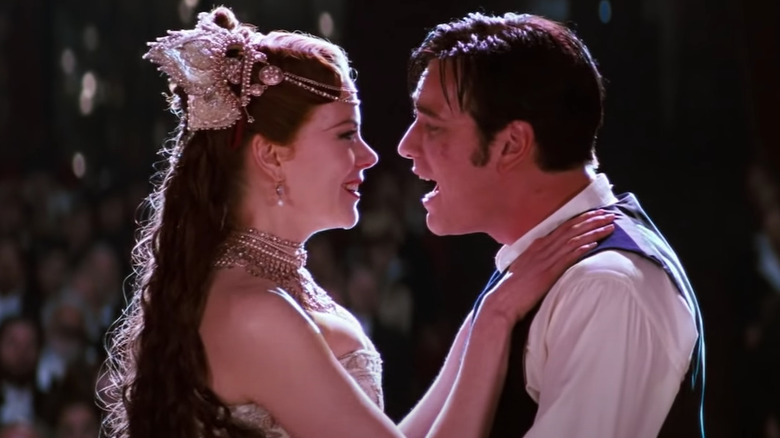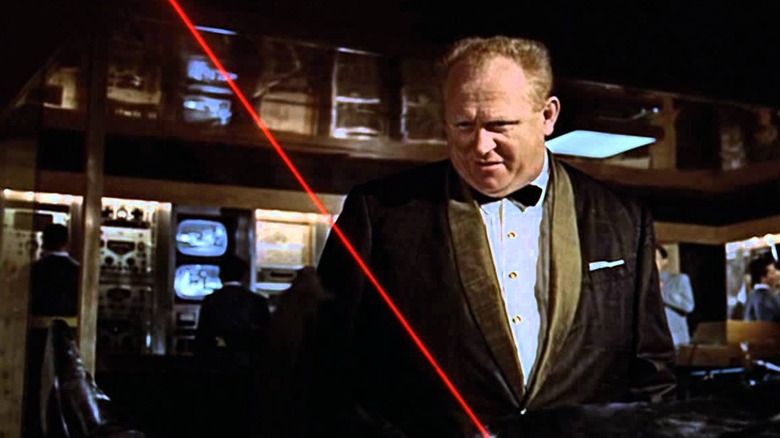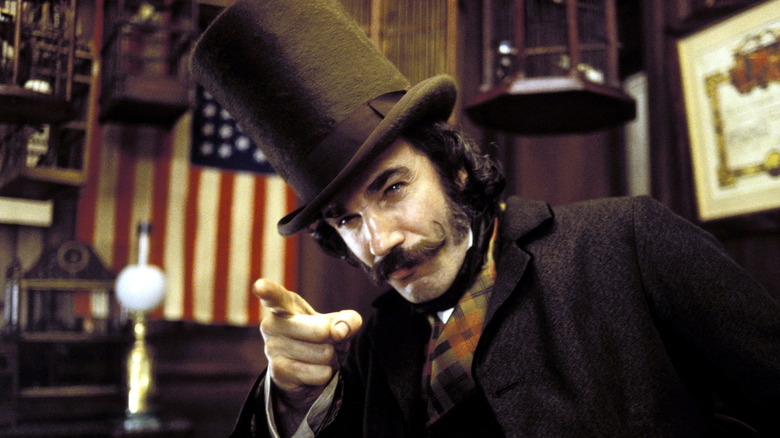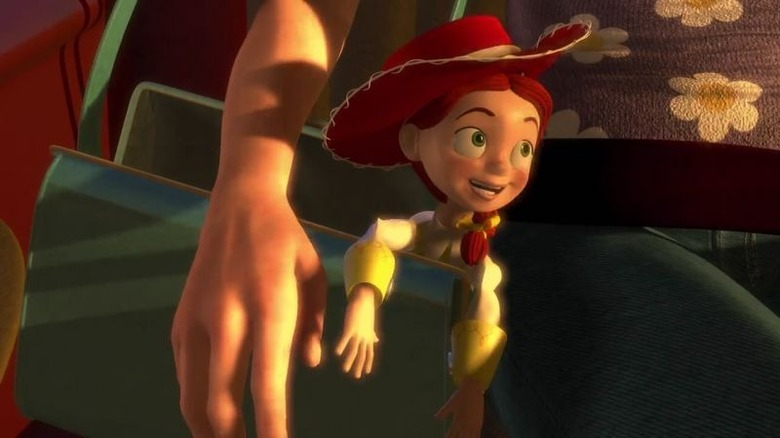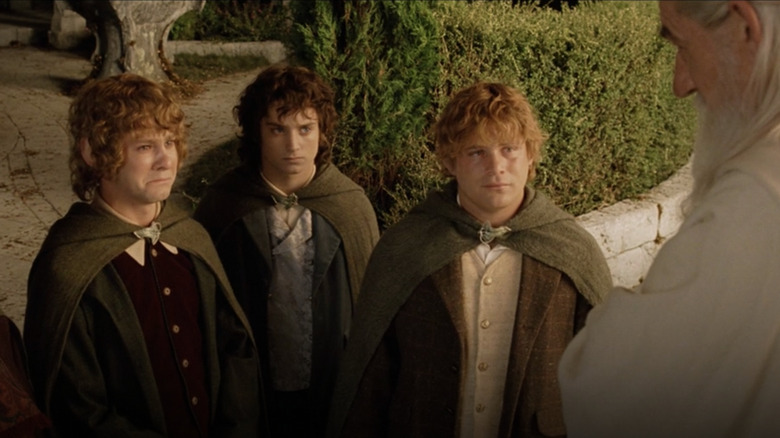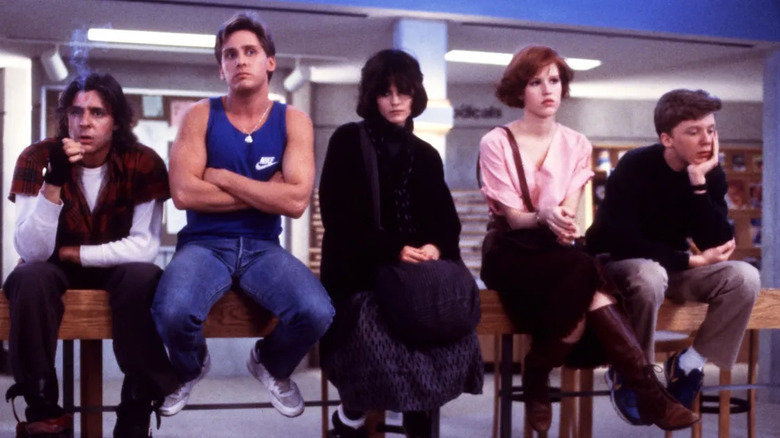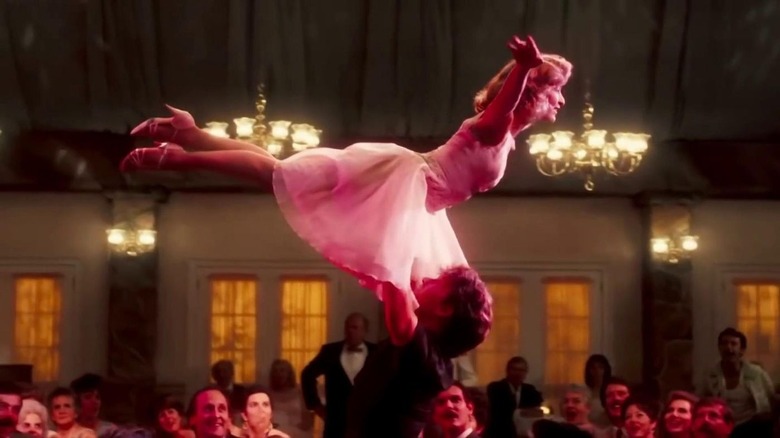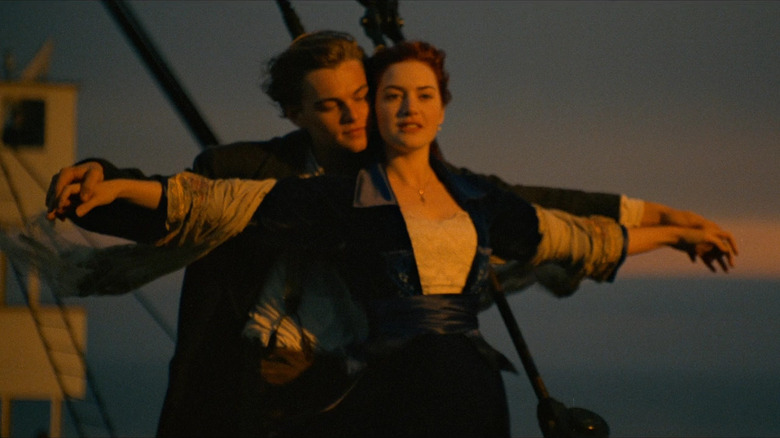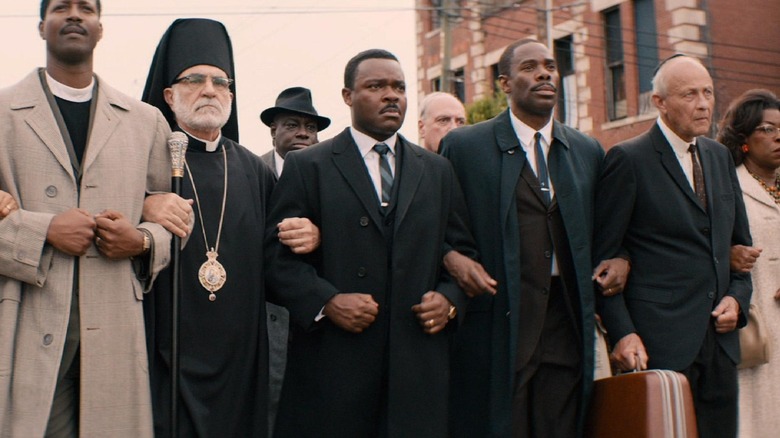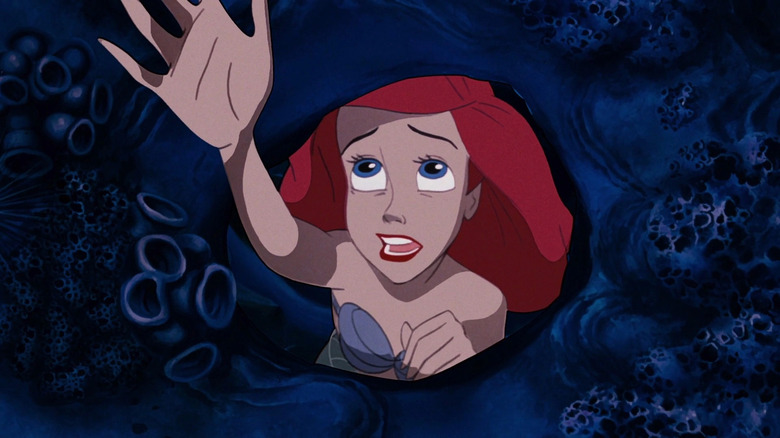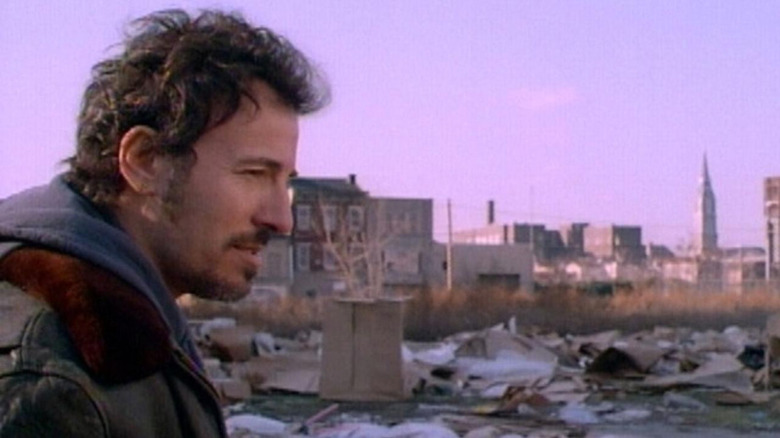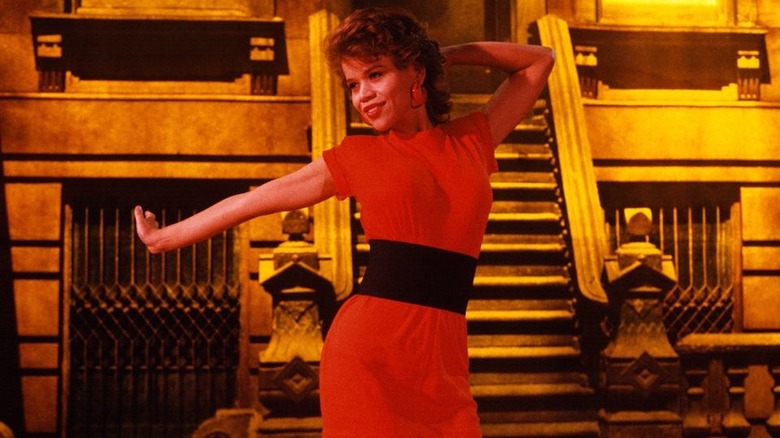The Best Original Songs Written For Movies
Filmmakers like Sofia Coppola and Martin Scorsese have perfected the art of the needle drop: placing a pre-existing song within a film to conjure a specific mood or comment on the narrative's themes. But equally as important is the collaboration of musical artists on an original song that is tailor-made for a film.
Original songs can either be non-diegetic (unheard by the characters because it exists outside of their world) or diegetic (a song that the characters can hear or sing themselves). This list explores films from across a wide range of genres and styles with songs that flawlessly capture their mood and aesthetic. These are the best original songs that were created specifically for a film to emphasize the story or flesh out the characters' perspectives, heard either during the narrative or over the end credits.
''Cat People (Putting Out Fire)'' from Cat People (1982)
Paul Schrader directs a lurid remake of the Jacques Tourneur 1942 horror film "Cat People" featuring a hypnotic new wave score by Giorgio Moroder to compliment the psychosexual themes of a beautiful woman's transformation into a lethal black panther. David Bowie's "Cat People (Putting Out Fire)" adds to its transgressive stylings. In the final shots, the song overlays a close-up of the alert Irena in her panther form. The soaring octave change "with gasolineeee" kicks in as soon as she opens her fearsome jaws.
When interviewed about the song for the book "Ashes to Ashes: The Songs of David Bowie 1976–2016," Bowie said: "It works on a dream state, it feels like the kind of thing you go through at night. That's the way I look at it lyrically." The words do have an ethereal eroticism that matches the film's tone. Bowie's seductive baritone references the deadly feline's piercing green eyes and the idea of "putting out fire with gasoline" hints towards the werecats' icky attraction in order to continue their ancestral line. Quentin Tarantino notably repurposed this song for his triumphant preparation scene in "Inglourious Basterds."
''Jai Ho'' from Slumdog Millionaire
Danny Boyle's Oscar-winning "Slumdog Millionaire" follows a young Indian boy who triumphs in spite of poverty, homelessness, and other such difficult ordeals. Dev Patel brings a wide-eyed optimism to the role of Jamal, who finds himself competing on the Indian version of "Who Wants to be a Millionaire?"
The end credits sequence honors Indian filmmaking with a Bollywood-style song and dance number to offset the gritty subject matter of Jamal's upbringing. The main cast energetically moves to "Jai Ho," by A.R. Rahman, which has a gleeful beat and catchy chorus that translates to "Hallelujah" or "Victory." It's quite fitting for the jubilant ending where Jamal wins the money and secures the affection of his childhood crush, Latika (Freida Pinto). The lyrics allude to the themes of destiny that director Danny Boyle toys with throughout the film, and the joy of finding someone who is the reason you breathe and believe in love. The brightly-colored merriment of "Jai Ho" leaves a lasting impression.
''I've Seen it All'' from Dancer in the Dark
Like the majority of Lars Von Trier films, "Dancer in the Dark" is a grueling cinematic experience. Von Trier manipulates the genre conventions of the classic Hollywood MGM musical for the bleak tale of an immigrant (Björk) with failing eyesight. "I've Seen it All" starts out slowly with the driving rhythm matching the train tracks, and builds to grand orchestrations as Selma insists that she will not despair over her blindness because she has already seen both positive and negative things throughout her life.
Selma refuses to dwell on what she hasn't seen because it will make her feel worse about her deteriorating vision. Bjork's sweet and gentle voice accentuates the character's altruism, and also twists a knife your heart. Her open-hearted spunk accompanied by the bright surroundings of a crystal-clear river and blue sky, moving train, and dancing townspeople makes Selma's ultimate fate even more devastating.
''Save Me'' from Magnolia
Paul Thomas Anderson's epic ode to human solitude, "Magnolia" was inspired by the work of singer/songwriter Aimee Mann and she was asked to compose songs for the film. "Save Me" accompanies the final scene with Claudia, a troubled young woman estranged from her sexually abusive father. The affable John C. Reilly plays a police officer who is called to check in on her after she blasts music during a cocaine binge. Over the course of "Magnolia," they develop an attachment, but Claudia fears that her traumas will push him away.
With Mann's song prominent in the background, the camera pulls closer and closer on Claudia's face as Reilly's character, his back turned to the camera and voice barely audible, says that he wants to make it work with her. For the first time, we see her smile — straight into the lens. Mann's low, calm vocals have a raw quality that underpin Claudia's longing for mental stability. Here is a girl in need of a tourniquet for her emotional wounds, as Mann sings in her haunted tones. She has possibly found someone to save her; another "freak" or outsider that she can relate to.
''Vindicated'' from Spider-Man 2
Millennials have a strong nostalgic affection for the emo rocker "Vindicated" at the end of "Spider-Man 2" by Dashboard Confessional. Thrillist details the origins of lead singer Chris Carrabba's composition of the song. In the half-whispered opening and passionate chorus, Carrabba expresses Peter Parker's turbulent emotions as he struggles to balance his dual human and superhero identities, longs for romance with Mary Jane, and deals with self-doubt. He yearns to be "vindicated" of these problems. The lyrics reference Mary Jane's engagement and Peter's hope dangling on a string that he will be able to honor his promise to Uncle Ben and face his responsibilities. "Vindicated" is the perfect song to accompany Sam Raimi's superhero melodrama, which deftly balances eye-popping visuals with high emotions.
''Falling Slowly'' from Once
The Academy Award-winning "Falling Slowly" is a delicate piece that captures the connection between a busker and an immigrant (played by musicians Glen Hansard and Markéta Irglová) in John Carney's 2007 film "Once." The low-budget musical follows them documentary-style as they write and record songs that reflect their burgeoning relationship. "Falling Slowly" begins with a light guitar and tender piano, then gradually swells to an ardent confession about being drawn to a stranger. The folk song is about slowly exposing your true self and vulnerabilities. According to Performing Songwriter, Hansard and Irglová wrote it over the course of a single evening and was a true back-and-forth collaboration. In the film, their intimate performance makes you completely forget that they are in the public setting of a music shop.
''Moon River'' from Breakfast at Tiffany's
One of "Breakfast at Tiffany's" most memorable scenes is in the opening in which the lithe Holly Golightly, dressed in a gorgeous black dress and oversized sunglasses, looks longingly in the Tiffany's window, munches on an oversized Danish, and sips coffee while Henry Mancini's instrumental version of "Moon River" plays. Later in the film, Audrey Hepburn performs the song with Johnny Mercer's lyrics. Paul "Fred" Varjak, the object of Holly's affection, overhears her on the fire escape accompanying herself on the quiet guitar, barely audible over the swirling strings.
With tight close-ups of her beautiful, longing face, Audrey Hepburn's gentle voice carries the song's dulcet tones and the soft words evoke her melancholic loneliness. The nostalgic lyrics of rainbows and huckleberries were inspired by Johnny Mercer's carefree childhood in Savannah, Georgia. In the wavering harmonica, we hear the tenderness of summertime.
''Lose Yourself'' from 8 Mile
"Lose Yourself" was the first rap song to win the Academy Award for Best Original Song. It's from Eminem's semi-autobiographical film "8 Mile," in which he stars as an aspiring rapper named B-Rabbit from Detroit. NME praised the song's use of adrenaline-pumping instrumentals, the "thundering rawk guitars and Rocky-ish bassline" that carries his urgent delivery. The song notably occurs in the sequence where B-Rabbit, so nervous to compete in a rap battle that he can only get sick or stand in silence, finally gains the courage to spit out a furious rhapsody. "Lose Yourself" draws on Eminem aka B-Rabbit's personal history: his desire to rise from poverty and traumatic upbringing to become a successful rap artist. The inspiring rap is performed with a feverish aggression about seizing the moment and losing yourself inside of your creative passions so that you are no longer self-conscious.
''Come What May'' from Moulin Rouge
"Come What May" was originally written for Baz Luhrmann's modern retelling of Shakespeare's "Romeo + Juliet" (and the title is lifted from another Shakespeare play, "Macbeth"). Instead, it ended up being used for another pair of star-crossed lovers: Christian and Satine in Luhrmann's dazzling jukebox musical "Moulin Rouge!"
The stirring love proclamation of "Come What May" plays an important role in the film. Christian writes it for his musical that Satine is performing in, but it also serves as a secret reminder that their forbidden love is deep and true — even as Satine must pretend to love The Duke for money. The simple lyrics are dripping with sentimental romance, thanks to Ewan McGregor's soaring voice and Kidman's dainty warmth. Christian and Satine pledge their love to one another across the changing of seasons, until their dying day — which tragically comes sooner rather than later for one of them.
''Goldfinger'' from Goldfinger
Shirley Bassey's brassy voice and the wailing trumpets make "Goldfinger" one of the best songs in the James Bond canon, as Bassey sharply spits out her disdain for the cold-hearted, modern day King Midas villain Auric Goldfinger. The song is brought to life in a hypnotic title sequence with Sean Connery as James Bond superimposed against gold-plated women. In the final verse, Bassey growls out Auric's obsession with gold, and her elongated final note blasts as if to clarify Auric's overwhelming obsession. "'Gold-finga!" she snaps, backed by composer John Barry's iconic, sensual jazz sound. This combination adds a sense of mystery, dread, and even allure to Bond's entanglement with Goldfinger. Bassey's booming voice warns the womanizing spy of the dastardly criminal who charms with golden words.
''Hands That Built America'' from Gangs of New York
The Irish post-punk band U2 was the perfect choice to underscore the finale of Martin Scorsese's sprawling epic "Gangs of New York," the story of a 19th century Irish settler named Amsterdam who returns from jail to seek revenge on his father's killer, the anti-immigrant gang leader Bill "the Butcher" Cutting. U2 salutes all of the hands that built America: "Russian, Sioux, Dutch, Hindu, Polish, Irish, German, Italian," and "The Irish, the Blacks, the Chinese, the Jews, Korean, Hispanic, Muslim, Indian." They are the backbone of this country and the reason we are standing tall today. Many of these immigrants crafted the mammoth steel that soars into the city skies.
Scorsese displays their incredible contribution in the breathtaking ending where Amsterdam buries Bill in a Brooklyn cemetery next to his father. Against the moving strings of "The Hands That Built America," images of the New York City skyline evolving over the next century fade into and out of one another. We see the Brooklyn Bridge and the World Trade Center rise as the cemetery watches on, eventually becoming a forgotten patch of weeds. It's a pitch-perfect ending that honors those who came before us and their historical contribution to the incredible, thriving metropolis of New York City and the rest of America.
''When She Loved Me'' from Toy Story 2
The A.V. Club jokes that, "There are two kinds of people: People who weep during the 'When She Loved Me' montage, and people who lie about it." "When She Loved Me" was composed by country crooner Randy Newman, who penned other great music for the "Toy Story" franchise such as "You've Got a Friend In Me" and "We Belong Together." The heart-wrenching ballad from "Toy Story 2" overlays a montage from the perspective of tough cowgirl Jessie, who was abandoned by her former owner, Emily.
In golden-hued flashbacks, we see their sweet bond when Emily was a child; they swing on a tire and spin around in grassy fields. Jessie ends up falling and getting trapped under the bed, where she watches Emily grow into a teenager and becoming more interested in music and doing her nails. When Emily eventually finds her, Jessie thinks she has finally been reunited; she sleeps peacefully next to her beloved owner ... until she realizes she has been abandoned at a donation truck. Sarah McLachlan's angelic voice, the gutting lyrics about losing a loved one, and the sparse piano underscores the agonizing montage. The end of childhood has never been captured so poignantly.
''Into the West'' from Lord of the Rings: The Return of the King
There were two original songs, "May It Be" and "Gollum's Song," that built on the themes of the first two "Lord of the Rings" films, but "The Lord of the Rings: The Return of the King" needed a song to conclude the epic series overall. At first, composer Howard Shore was going to include a lament from the "The Grey Havens" chapter, but it wasn't as grand in scope. Inspired by the untimely passing of a 16-year-old Māori New Zealand filmmaker named Cameron Duncan, Howard Shore, screenwriter Fran Walsh, and singer Annie Lennox composed "Into the West" (via the Extended Edition Appendices, Part 6, "Music for Middle-earth" and "Cameron Duncan: The Inspiration for 'Into the West'"). The melody incorporates musical themes used throughout the trilogy, including the triumphant "Black Gate Opens" as Sam carries Frodo up to Mount Doom.
The somber yet peaceful lyrics detail the Undying Lands where Frodo and Bilbo go to rest after suffering with the ring for so long, and reference Gandalf's monologue to Pippin about the beauty of the afterlife: "The grey rain-curtain of this world rolls back, and all turns to silver glass. ... White shores, and beyond, a far green country under a swift sunrise." Annie Lennox's soulful voice, the simple guitar, and floating flute not only encapsulates the tearful farewell between the hobbits but the total end of an arduous journey.
The tranquil "Into the West' plays over the end credits of "The Lord of the Rings: The Return of the King," which include beautiful illustrated portraits of the cast. The battle for Middle-Earth is over, and we feel both relief for the fellowship and sadness that this incredible fantasy series has come to an end.
''Don't You (Forget About Me)'' from The Breakfast Club
After five teenager archetypes spend a weekend detention together in "The Breakfast Club," — the brain, basket case, princess, jock, and criminal — they realize that they have a lot in common. The opening chords of Simple Minds' "Don't You (Forget About Me)" play underneath their manifesto to Principal Vernon: they are more than what meets the eye. The rich keyboards, motivating drums, and Jim Kerr's deep croon accompanies John Bender, the criminal, walking down the football field in his oversized trench coat. He raises his fist in a declaration of anti-authoritarianism, defying the insipid adults who ignore their emotional truths and stifle their authentic selves.
The pining lyrics foreshadow the characters returning to their respective cliques on Monday. As the slow change of adulthood pulls them apart, they promise never to forget the brief but impactful time they spent together. Somehow this little Glasgow new wave band managed to capture the turbulent emotions and nostalgia of teenagehood in its melancholy and romantic sound.
''(I've Had) The Time of My Life'' from Dirty Dancing
Thrillist details the fascinating history behind "(I've Had) The Time of My Life," the Academy Award-winning original song for the exhilarating "Dirty Dancing" finale. Despite taking place in the 1960s, "Dirty Dancing" uses 1980s songs such as Eric Carmen's sexy "Hungry Eyes" to connect contemporary stylings with nostalgia for a bygone era.
Bill Medley and Jennifer Warne's love duet is the song Johnny chooses to end the talent show with his own unique creative vision. Johnny thrusts Baby out of the corner and puts her onstage where they dance together. The lyrics summarize their relationship: a fleeting but perfect time in their lives where they fell madly in love. The upbeat song builds to an aspirational crescendo where Baby nails the long-anticipated lift. "(I've Had) The Time of My Life" is the perfect song to capture the end of this sweet, feminist coming of age film about summer romance. It's about a first love that may not last forever, but at this moment means everything.
''My Heart Will Go On'' from Titanic
"My Heart Will Go On" is the full-throated ballad that plays at the end of the monumental blockbuster "Titanic." Written by the film's composer, James Horner, the romantic lyrics "communicate Rose's love for Jack, which might be brief, but it's a love that's as deep as the ocean and will remain in Rose's heart for a lifetime." Despite her grief, Rose fulfills Jack's dying promise to endure and make the most of her life. Celine Dion brings Jack and Rose's great passion to life with her powerful voice, especially in the final verse where, after a somber flute solo, her voice ascends to a resonant belt. "My Heart Will Go On" brings together the tragic themes of grief and true love. Its sentimental grandeur is fitting for James Cameron's melodrama about two ill-fated lovers aboard the equally ill-fated ship of dreams.
''Glory'' from Selma
Ava DuVernay's "Selma" is a searing examination of Martin Luther King, Jr.'s public and private lives, anchored by David Oyelowo's gripping performance. The end credits feature the Academy Award-winning original song "Glory," written by John Legend, Common, and Rhymefest. "Glory" is a heady mix of John Legend's silky vocals and Common's forceful delivery that illustrates the struggles of the Black community across the decades. It's an inspiring call for social justice. NPR's pop critic Ann Powers writes on the soul influences of "Glory":
The song is structured sort of like a bridge between the gospel music that was so crucial to the civil rights movement and contemporary R&B and rap. So John Legend's part is very stirring, very uplifting, taken right out of gospel. And then you have Common, who also plays a preacher in the film, rapping in a very preacherly style and even bringing in references to contemporary politics, like Michael Brown's shooting and the protests that happened in Ferguson this past year.
Legend and Common's powerful voices and the stirring strings epitomize all of the hope, rage, and effort in the fight for racial equality. "Glory" is a pivotal work that brings the past and present together in an urgent demand for change.
''Part of Your World'' from The Little Mermaid
There are countless Disney tunes that deserve to be on this list, but there is one key song that highlights the key to the studio's '90s golden age of animation. "The Little Mermaid" was a vital turning point for Disney, because it featured a Broadway song structure. Lyricist Howard Ashman and composer Alan Menken included an "I Want" song — a solo musical number for the main character that express what they want to change about their life. In "Part of Your World," Ariel declares her burning desire to live as a human in the world above. Sung with sweet-voiced passion by Jodi Benson, it allows the audience to identify with the teenage mermaid's struggles. The song also establishes that Ariel's love of the human world started way before she ever saw Prince Eric. It took her a long time to build that collection of thingamabobs!
''Streets of Philadelphia'' from Philadelphia
For the opening montage of "Philadelphia," director Jonathan Demme originally envisioned a hard rocking song. He specifically chose Bruce Springsteen to write it because, much like star Tom Hanks, Springsteen was an American everyman who could help make a film about a gay man with AIDS more palatable for conservative audience members during the 1990s. This was part of Jonathan Demme's goal to have the film change minds by reaching mainstream viewers (via Rolling Stone).
Springsteen composed a mournful ballad with a simple drum machine beat and layered synths, lending it a reverent quality. His use of first person narration puts the listener in the shoes of the countless men and women whose lives were tragically taken by AIDS. The simple poetics of the main character's physical and emotional despair — wasting away until he is unrecognizable, left alone to hear the voices of those left behind — are devastating and intensely relatable to anyone who is dealing with pain. This kind of intimate and universal perspective was especially important during a time period when HIV-positive people were feared and castigated by society.
Through a contemporary lens, "Philadelphia" has questionable queer politics, but there is no denying that Springsteen's poignant contribution to the film was essential in garnering empathy to mainstream audiences for HIV-positive people, especially those within the LGBTQ+ community.
''Fight the Power'' from Do the Right Thing
Spike Lee's groundbreaking "Do the Right Thing" takes place on the hottest day of the year in the Bedford-Stuyvesant area of Brooklyn, where racial tensions explode into violence after a cop murders the boombox-carrying Radio Raheem. The film features one of the most audacious openings of all time. With gritted teeth, thrashing limbs, and nimble feet, Rosie Perez dances furiously to Public Enemy's "Fight the Power" — a song commissioned specifically for the film.
Rolling Stone calls the fierce hip-hop track "a dissonant call to revolution" that critiques iconic white figures such as John Wayne and Elvis Presley for cultural appropriation and chauvinism, as well as other racist institutions such as the U.S. Postal Service. Hank Shocklee, a member of Public Enemy's production team, told Rolling Stone that the group wanted "Fight the Power" to have a "defiant, aggressive, I'm-not-gonna-take-it feeling," and this comes across in every sweat-dripped stomp from Rosie Perez.
